On 17-21 November three Armenian journalists visited Azerbaijan, and three Azerbaijani journalists visited Armenia. Hardly earth shaking news. But in the reality of present day Caucasus this was a small but important step forward.
The exchange visit of the journalists was the result of considerable discussions and negotiations between the Foreign Ministries of Armenia and Azerbaijan and co-ordinated by the OSCE Chairmanship special representative Ambassador Andrzeij Kasprzyk.
Even though some may prefer not to call it such, this was a confidence-building measure, aimed to add some positive momentum to ongoing negotiations on the Karabakh conflict and its resolution. These negotiations, facilitated by the OSCE Minsk Group co-chair countries (France, Russia and the United States) do not appear to be going anywhere very far, but at least the lines of commuinication are open, and the sides are ready for steps forward, even if tiny ones.
Next week, it will be the turn of diplomacy again. The foreign ministers of Armenia and Azerbaijan will meet in Bratislava, on the margins of the Annual OSCE Ministerial meeting. No doubt the journalists exchange will be cited as an important positive step forward, which it was. But in truth hundreds of such exchanges, involving all sort of sections of society, are going to be required before the minimum level of trust that all know is necessary for achieving a breakthrough in the negotiations is attained.
So whilst all those concerned should be allowed a moment of satisfaction one hopes that it will not be another year before the next confidence building measure is given the green light.
source: commonspace.eu
photo: Armenian journalists in Baku as part of an exchange visit involving Armenian and Azerbaijani journlists that took place 17-21 November 2019 (picture courtesy of haqqin.az, baku)






